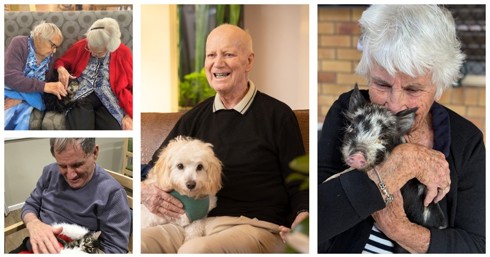Estia Health reveals the magic of animals in aged care
01/08/2025

Animal companionship is becoming a cornerstone of wellbeing in residential aged care – and for good reason. Whether it’s a friendly cat curled up on a resident’s lap, a therapy dog’s wagging tail, or even a visit from farm animals or kangaroos, animals bring moments of joy, purpose, and connection.
Estia Health, which recently expanded its network with the purchase of Mark Moran Group’s Little Bay and Warrawee aged care homes in June, has seen firsthand how powerful these bonds can be.
More than smiles and laughter
The benefits of animal interaction in aged care go far deeper than the obvious delight on residents’ faces. Research shows animals can reduce loneliness, lift mood, stimulate memory, and even help ease behavioural changes linked to dementia.
For residents in the early stages of dementia, simple activities like walking, stroking, or brushing a pet provide sensory stimulation that helps them stay present and engaged. For those with vision or hearing impairments, petting an animal offers a unique and comforting form of connection.
Animals as part of the care team
Within Estia Health homes, staff often say animals are “part of the care team.” They have an uncanny ability to sense when a resident is having a tough day, providing comfort and companionship where words might fall short.
“Animals bring a spontaneity and warmth that can’t be replicated,” an Estia Health employee explains. “They offer unconditional love, and our residents feel that.”
From cats and dogs to robotic pets designed for dementia care, every interaction reinforces one simple truth: care comes in many forms. Across Estia Health’s 87 aged care homes, animals help create a daily environment of connection, love, and belonging.














